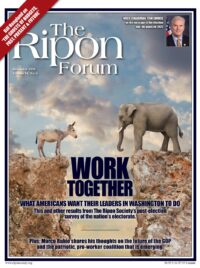 In November 2020, America elected a new president, a new Congress, and a new Senate. Or rather, fifty states held elections, each by their own rules and procedures, and together they elected a new government. The election also generated all kinds of claims about the illegitimacies and unfairness. America’s federal system has often been a source of strength, allowing states to experiment and innovate, and giving them the flexibility and freedom to pursue their own course. But for national elections, federalism has, unfortunately, become a source of weakness, doubt, uncertainty, and illegitimacy. It is time for national standards.
In November 2020, America elected a new president, a new Congress, and a new Senate. Or rather, fifty states held elections, each by their own rules and procedures, and together they elected a new government. The election also generated all kinds of claims about the illegitimacies and unfairness. America’s federal system has often been a source of strength, allowing states to experiment and innovate, and giving them the flexibility and freedom to pursue their own course. But for national elections, federalism has, unfortunately, become a source of weakness, doubt, uncertainty, and illegitimacy. It is time for national standards.
For decades now, Americans have been losing faith in the legitimacy of our national elections, particularly when the outcome is unwelcome. Between allegations of suppression, fraud, foreign meddling, and other acts of malevolence, partisans on both sides have built strong narratives about how the election system is unfair, and have employed armies of lawyers to challenge any rules they think might hurt their party. Meanwhile, partisan state legislatures, convinced that the other party is trying to cheat their way to victory, play their own games of seeing what they can get away with by changing the rules of who can vote and when, and drawing district lines to advantage their party.
America is unusual in not having national standards for elections. Most advanced democracies, even federal ones, have a national agency that guarantees standard voting registration processes that make it straightforward to vote, and ensure all votes count equally by keeping districting out of partisan politics.
America is unusual in not having national standards for elections.
Congress has within its powers (Article I, Section 4) the ability to strengthen and standardize federal election rules and enable a new agency to enforce rules, just like most advanced democracies. Such an agency could set baseline requirements on voting registration, absentee voting, ballot design, district line-drawing, and election security, among other areas. It could also build out an “election forensics” team that can determine whether fraud, interference, or suppression tipped the balance in a given race. Such an agency would protect state and local election administrators from partisan meddling by state legislatures and threats of litigation from partisan lawyers.
One might argue that it is precisely the diffuse nature of our federal elections that makes them secure, both because it is hard for a hacker to access all elections, and because federal power offers a bulwark against an authoritarian takeover of federal election administration. This is a mis-reading of reality. Because we have so many election authorities, and so many lack the resources and expertise to implement the most effective security, there are more vulnerabilities in our diffuse system. And since the balance of power in Washington often hinges on a few thousand votes in a few key jurisdictions, just a few weak links can undermine the entire election.
To be sure, a nationalized agency could be vulnerable to centralized takeover, if not properly designed. Therefore any such agency that enforces such rules must have a clear mandate based on widely supported principles of democratic fairness, strong independence, and an empowered inspector general to monitor any potential abuses of that power. The sound record of independent election administration across democracies suggests this is achievable. Compare that to the long record of partisan abuses in our federal patchwork.
Most advanced democracies, even federal ones, have a national agency that guarantees standard voting registration processes that make it straightforward to vote.
How might the public respond? Voters want elections that are fair. But perceptions of fairness have become partisan, and most voters follow partisan cues to determine what is fair and what is not. Likely, any proposal to standardize federal election rules would provoke a backlash from those who fear that national standards would harm their party’s chances at winning elections, most likely Republicans.
Such perceived partisan advantage may or may not materialize. Much would depend on how the parties responded to a changed electoral landscape such standards would produce. If current Republican leadership believes they can only win under a system where they maximize advantages in states they control, this creates a very dangerous strategic approach to electoral politics. When fighting over the basic rules of democracy becomes more important than appealing to the political center, democracy is threatened. In order for democracy to work, all parties must agree on the fairness and legitimacy of the basic rules, and acknowledge an impartial process, even when they lose.
But because America’s patchwork set of partisan rules means that losers can point to shenanigans on the other side, we all lose that shared sense of fairness on which democracy depends. One side might view a federal agency as a power grab. But only by setting clear and consistent national standards can we end the partisan gamesmanship at the state and local levels, return political competition to the issues instead of the rules, and end the doom loop of state-level partisan power grabs that is undermining our democracy
Lee Drutman is a senior fellow in the Political Reform program at the think tank New America, co-host of the Politics in Question podcast and author of the book, “Breaking the Two-Party Doom Loop: The Case for Multiparty Democracy in America.”




